|
|
|
CONTACT US
Click Here! |
| This site is best viewed with a screen resolution of 800 X 600 at high colour settings |
|
Flask List
Acacallis-Ancistrochilus Angraecum-Aspasia Barkeria-Broughtonia Bulbophyllum Capanemia-Catasetum Cattleya Cattleyopsis-Cycnoch, Cymbidium-Cyrtorchis Dendrobium-Dossinia Encyclia-Eulophiella Galeandra-Jumellea Laelia-Lycaste Macodes-Nephalaphyll, Odontogloss,-Oncidium Paphiopedilum-Psychilis Rangaeris-Stenocoryne Tainia-Zygopetalum |
|
Plant List
Acampe-Bulbophyllum Cattleya-Dossinia Encyclia-Promeaea Renanthera-Vanda |

Bottles and conservationRare orchids on shelvesBottles, racks and shelves of bottles. Ten green bottles??? more like 10,000 bottles full of rich green seedlings and protocorms of well known, and unknown, rare orchid species.I'm standing in the middle of the flask storage, growing area at Burleigh Park. The area is well lit with natural sunlight under a translucent roof. There are bottles everywhere, and I ask Ian and Pat Walters, "Exactly what have you got here?".
And who sows and flasks all the species? "Pat and I both work at the reflasking cabinets, it's more than a 2 person operation to keep up with the flasking now. A few years ago, before CITES stopped the trade in may species, we were sowing just a few species, now we sow everything in the interests of conservation. It has taken years to build up contacts and arrange the successful exchange of seed and protocorm world wide.
Looking at the rows of bottles, I ask if there are any special stories to tell about the origin and history of some of the species in flask. "Every new germination brings a feeling of achievement, that here is another endangered species that eventually will be cultivated and conserved, real conservation. Several species have their own particular interest, like the Pachystoma from Hong Kong. This was germinated from seed collected from a wild population that stood in the way of progress. Hong Kong has a tremendous land shortage, with huge areas being cleared for housing, airports etc. The seed was taken from plants that may no longer exist in the wild, and we will be returning material to Hong Kong. The other twist to this is that the Pachystoma is a form of our own Australian species, which is also endangered due to land clearing, and the population that I knew of has disappeared." Do you flask Australian species as well? "Whatever seed we can get, we sow into flask in the hope of eventually finding someone prepared to cultivate the species. It is a real pleasure to have now, in flask, seedlings of the actual type form of Sarcochilus cecileae. This orchid species has been collected from the rock faces around Townsville to the extent that there are only a few plants remaining in the wild.
On an international conservation level, we have things in flask like Coryanthes macrantha, a native of Costa Rica and considered extinct in that country. I can remember receiving a letter from a grower in Costa Rica, commenting on our list, and out of all the species we had, the Coryanthes macrantha was the most exciting to him."
Ian comments; "We receive a lot of our seed from international nurserymen, and long ago came to the conclusion that if you want species propagated and conserved, then give the seed to the professionals who have a vested interest in propagating the species in quantity and distributing it. A nurseryman will propagate and distribute as much as he can, where most hobby growers, if raising seed, are really only interested in the small quantity that they can handle.
We ask growers continually for seed, so that we can distribute species seed internationally. What may be common here could be rare in places like South Africa, Brazil and Hong Kong. If we send out seed, we get different species back, and if germiation is successful, then those species are available as artificially propagated plants in Australia."
The tube of protocorms Ian showed me demonstrated conservation by propagation. His comment; "We can airmail and receive sterile tubes of protocorms easily, it is a quick method of transfer of material for reflasking" I looked at the sterile tube of Macodes sanderiana, it had come from New Guinea; I must get a seedling of that! and perhaps a seedling of the Coryanthes, the tube that came from the U.S.A., as well.
May their conservation efforts, and the seedlings in all those bottles, so many bottles, grow successfully. |
Northern Editor.
May be reproduced provided source acknowledged.
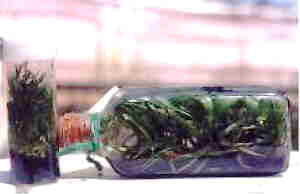 "We must have about 800 plus species actually germinated and growing in flask, with continual sowings of seed from our international contacts. Seed is exchanged with about 25 international growers, mostly species specialists, who are conservation minded."
"We must have about 800 plus species actually germinated and growing in flask, with continual sowings of seed from our international contacts. Seed is exchanged with about 25 international growers, mostly species specialists, who are conservation minded."
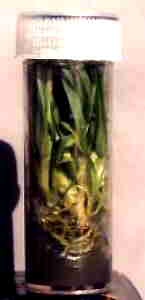 We also send internationally sterile tubes of protocorms, and in return we acquire some of the most rare species."
We also send internationally sterile tubes of protocorms, and in return we acquire some of the most rare species."
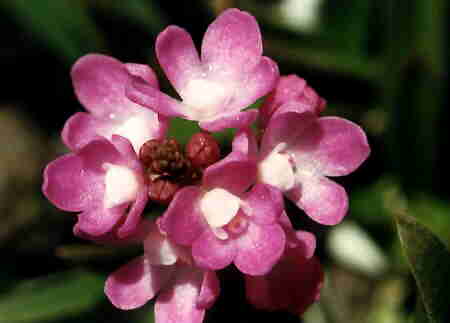 Its holotype location is Townsville, and we were given a seed pod from that location. The plants are a distinctive form, and we plan on producing community pots and returning plants to the wild.
Its holotype location is Townsville, and we were given a seed pod from that location. The plants are a distinctive form, and we plan on producing community pots and returning plants to the wild.
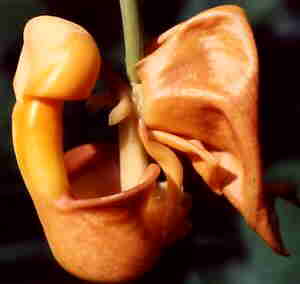 I watch as Ian unpacks an airmail letter containing packets of seed. Catasetums, Stanhopeas, Dendrobium amabile and others.
I watch as Ian unpacks an airmail letter containing packets of seed. Catasetums, Stanhopeas, Dendrobium amabile and others.
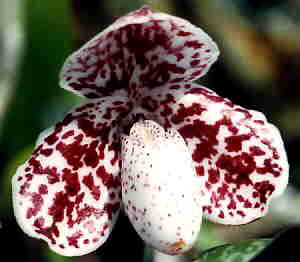 One of our contacts wrote back to tell us that out of the material we sent to him, he raised over a thousand seedlings of one species for distribution in France. Now a thousand plants in cultivation is real conservation, it provides propagation material for the future and takes the pressure off wild populations.
One of our contacts wrote back to tell us that out of the material we sent to him, he raised over a thousand seedlings of one species for distribution in France. Now a thousand plants in cultivation is real conservation, it provides propagation material for the future and takes the pressure off wild populations.
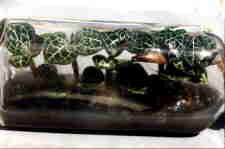 A good conservation policy, I thought, and looked at the little bottles designed to be airmailed world wide, as well as within Australia. Enthusiasts in Zimbabwe, Brazil, Singapore, Hong Kong, Denmark, England, Japan, USA and other countries must be thrilled to get these little bottles of rare orchid species all the way from Australia.
A good conservation policy, I thought, and looked at the little bottles designed to be airmailed world wide, as well as within Australia. Enthusiasts in Zimbabwe, Brazil, Singapore, Hong Kong, Denmark, England, Japan, USA and other countries must be thrilled to get these little bottles of rare orchid species all the way from Australia.
 With little persuasion, Ian and Pat, of Burleigh Park, loaned a few photographs of some of their favourite species. In flower, perhaps later in bottles!
With little persuasion, Ian and Pat, of Burleigh Park, loaned a few photographs of some of their favourite species. In flower, perhaps later in bottles!